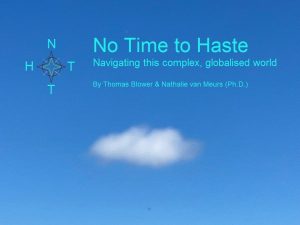No time to haste
Positive action comes from reframing life’s knocks into possibility. Be curious about many things; not fanatical about anything
Some people will always be barnacles. Aim to be a crab. You’ll roll with the current sometimes but at least you’re going places
No Time To Haste is a breath – an inhale and a longer exhale. It is also a tool to take the heat out of complex, divisive debates on how to engage well with people. As humans, we try to do our best for others when we are, in fact, acting to their detriment. Someone, entirely unsuitable for parenthood, may choose to have children to please the partner. Their actions reverberate across the generations, however, in the first instance they sacrificed their own needs for another. Now escalate that to a national scale – a government makes the decision to please a group of voters who fundamentally disagree with a tax on fuel. By now, this is a familiar conundrum: can human beings take into the consideration the impact of a decision on a generation perhaps not even born yet at the detriment of a current stakeholder?
We share some existential challenges such as the climate crisis. As our awareness of the space we inhabit increases, we see the interdependencies of our existence. As such, if humanity is to prosper, it – the collective – needs to change how it goes about sustaining growth numerically, economically, healthily on our one, finite planet. As we narrow our perspective we see fundamental changes afoot to the world of work and our place within it. Infinite growth can neither be resourced by mineral wealth, nor by our own endless productivity. Just as our economic activity has an impact on our living ecosystem – our own biological and sociological systems feel the effects of an economic system built to maximise shareholder value.
Our world feels like it is in flux ever more than before. We face unimaginable uncertainty in terms of the future of our planet, this much is clear. Yet, we know that our ancestors also had to deal with huge challenges that span across countries and affect people from all socio-economic backgrounds. Still, it may be for the first time in history that individual people have an acute sense of responsibility. It may sometimes feel like you’re wielding a sword, wearing armour. At a personal level, we know the advice: eat plants, plant trees and try to reach beyond your echo chamber. That means we need to work together; share a platform and forego the role of the sole hero, maverick or ruler. The VUCA (volatile, uncertain, complex and ambiguous) challenges that we face collectively requires us to acknowledge our interdependency with one another and the planet.
To some, biologists and evolutionary psychologists, we are monkeys with stories. We are mammals with a technological advantage and a propensity for innovation that perhaps developed faster than some of our interactional skills and behaviours. We share this planet with 7 billion, to increase to 11 billion by 2100. Whether you agree with the monkey moniker or not, you may recognise the importance of human stories. Across the ages, stories served as a consolation and confirmed our place in the universe. Whether religious scriptures of any faith, enlightenment, or ideological frameworks such as capitalism, we need something to give us courage to get up in the morning. Philipp Blom, historian, suggests that we need a new story but that this needs to be in symbiosis with the planet. This requires a cultural change across the globe but instead of viewing it as a sacrifice, view it as a choice: if you choose to live in Oxford you can’t live in New York or Shanghai. Blom argues that a 0% growth economy is not desirable because democratic, human rights societies are complex and need a stable, strong economy to sustain the needs of all in an inclusive way. We need to find a balance between growth and reduction. Our diverse but complex world allows us to know that a dandelion seed may travel as far as 60 miles. It may seem to be a random fact but it means that someone was interested and curious enough to log this fact. Together, we log and learn, share and create. It is the one way that we contribute to the collective puzzle.
As part of this journey, the book is one tangible outcome. No Time To Haste is more than this, however, it is a contribution to the larger Transdisciplinarity discussion. It is evident that this field, in academic and practical terms, will be increasingly important as we naviate this complex and beautiful world together.
